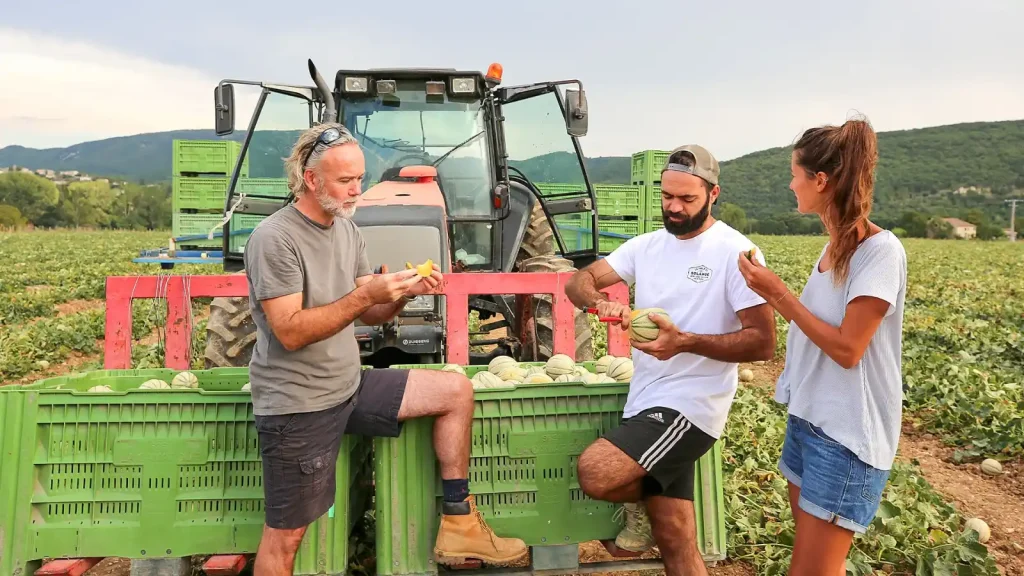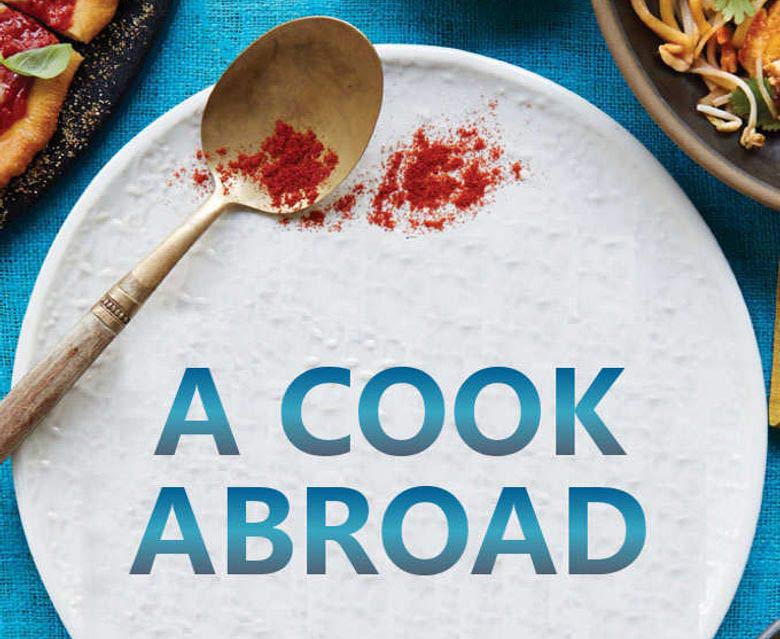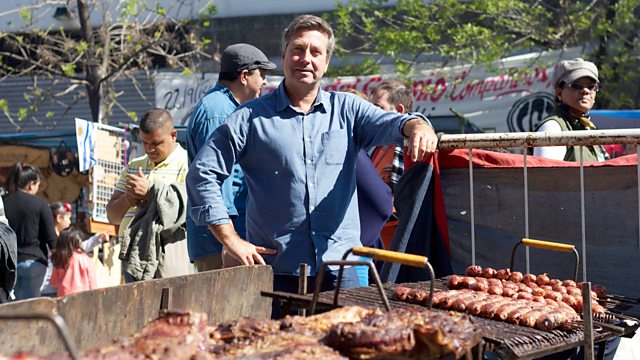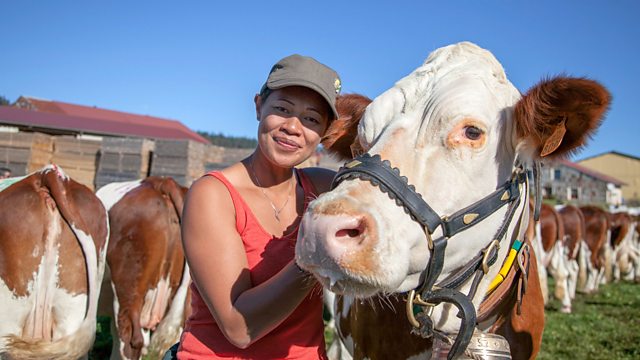Marcus Wareing Simply Provence episode 7: In the heart of Provence, the local markets burst with a vibrant selection of fresh fruit, each piece a testament to the region’s rich agricultural heritage. This abundance of local produce sparks a culinary curiosity in Marcus Wareing. Known for his innovative approaches to traditional dishes, Marcus is intrigued to explore how the French celebrate their fruit, much like the British cherish their strawberries and cream or apple crumble.
Marcus’s culinary journey begins with an exploration of melons, widely celebrated as Provence’s summer staple. Keen to blend a bit of British nostalgia with this French favorite, Marcus experiments by serving a classic British retro dish—prawn cocktail—inside a hollowed-out melon half. However, this unconventional pairing quickly teaches Marcus a valuable lesson: in Provence, melons are revered just as they are, and his creative twist is met with polite skepticism from the local farmers.
Eager to recover from his faux pas and deepen his understanding of French fruit-based desserts, Marcus arranges a friendly cook-off between himself and Chef Julie, a local culinary talent known for her dedication to traditional French recipes. The competition: a battle of classic desserts from their respective homelands. Chef Julie opts to prepare an apple clafoutis, a beloved French dessert that delicately combines the sweetness of baked apples with a velvety, custard-like batter. In response, Marcus chooses to make an apple crumble, aiming to showcase the rustic charm and comforting flavors that have made it a staple in British homes.
As the desserts take shape, the kitchen fills with the aroma of baking apples and cinnamon, mingling with the subtle sweetness of Chef Julie’s clafoutis. The friendly rivalry culminates in a tasting session where local diners savor the contrasting textures and flavors of the two dishes, appreciating the culinary expressions of each culture.
Still determined to show his respect for the local produce and redeem his earlier culinary misstep, Marcus invites the melon farmers to a specially prepared dinner. The menu features an array of simple yet sophisticated dishes: charcuterie, mackerel pâté, and baked cheese, all designed to complement rather than overshadow the natural flavors of the melon. This time, he serves the melons sliced, not stuffed, allowing their natural sweetness and freshness to shine. The evening is a success, with the farmers expressing genuine appreciation for Marcus’s humble yet thoughtful approach to one of their most cherished fruits.
Throughout “Marcus Wareing Simply Provence Episode 7,” the celebrated chef not only explores the nuances of local and traditional recipes but also bridges cultural gaps through his culinary endeavors. His journey through Provence is more than a mere quest for new recipes; it’s a deep dive into the respect and celebration of local ingredients, seen through the lens of mutual culinary appreciation between France and Britain.
This episode not only delights the taste buds but also warms the heart, as Marcus Wareing continues to weave his narrative of exploration, respect, and culinary innovation, proving that food is indeed a universal language capable of transcending borders and uniting cultures.
Marcus Wareing Simply Provence episode 7: Flavors of Provence
Craving a journey that tantalizes your taste buds and soothes your soul? Look no further than Marcus Wareing Simply Provence. This captivating BBC2 series invites you on a culinary adventure alongside Michelin-starred chef Marcus Wareing as he dives headfirst into the vibrant world of southern French cuisine.
Provence, a region synonymous with sun-drenched landscapes, charming villages, and an abundance of fresh, seasonal produce, becomes Wareing’s classroom. Here, simplicity reigns supreme. Dishes are built on the essence of quality ingredients, allowing their natural flavors to shine. But Wareing isn’t just here to observe; he’s here to learn.
Throughout the series, we witness Wareing embark on a delightful exploration. He ventures into bustling farmers markets, their stalls overflowing with plump tomatoes, glistening olives, and fragrant herbs. We see him forge connections with local producers, their passion for the land and its bounty evident in every interaction. He visits traditional family kitchens, where generations-old recipes are passed down with love and laughter. With each encounter, Wareing absorbs the essence of Provençal cooking – the respect for tradition, the focus on fresh ingredients, and the unpretentious joy of sharing a meal.
But Wareing isn’t afraid to add his own unique twist. With his acclaimed British culinary background, he brings a fresh perspective to these classic dishes. Imagine a pissaladière, the iconic Provençal onion tart, reimagined with a touch of smoked paprika, adding a subtle smokiness that complements the caramelized onions perfectly. Perhaps a daube de boeuf, the rich Provençal beef stew, gets a hint of ale alongside the traditional red wine, lending a deeper complexity to the flavorful broth.
Marcus Wareing Simply Provence isn’t just about the food, though it undoubtedly plays the starring role. It’s about the stories woven into every dish. We meet the hardworking farmers who nurture the land, the passionate chefs who transform simple ingredients into culinary masterpieces, and the families who gather around tables laden with love and laughter. It’s a celebration of the Provençal way of life, where food is more than sustenance; it’s a thread that connects people, cultures, and generations.
So, whether you’re a seasoned foodie or simply someone who appreciates the beauty of good food and good company, Marcus Wareing Simply Provence promises an unforgettable experience. Let Wareing be your guide as you embark on a journey of discovery, where the sun-drenched landscapes of Provence become a backdrop for a feast for the senses.
Mackerel pâté and baked goats’ cheese charcuterie board
Indulge in the delectable flavors of Marcus Wareing’s exquisite homemade mackerel pâté, meticulously crafted to perfection. Pair it with the tantalizing aroma of herby baked goats’ cheese, served alongside generous slices of crusty bread, inviting you to savor each delightful bite. Enhance your culinary experience by accompanying these savory delights with a refreshing assortment of melon and perfectly seasoned meats, ensuring a symphony of tastes on your palate.
Preparation for this culinary adventure begins with the ritual of setting up your barbecue. As you patiently wait for the coals to reach their optimal state – a pristine white-hot glow, with flames gently subsiding – you can feel the anticipation building for the culinary masterpiece that awaits.
Ingredients
For the mackerel pâté
- extra virgin olive oil
- 8 mackerel fillets, all bones removed
- few sprigs fresh rosemary, needles picked and chopped
- few sprigs fresh thyme, leaves picked and chopped
- 1 lemon, zest only
- 2 tbsp crème fraîche
- 2 tsp horseradish sauce
- sea salt and freshly ground black pepper
For the baked goats’ cheese
- 1 round goats’ cheese
- 10 cherry tomatoes, halved
- pinch fresh lavender
- pinch thyme leaves
- drizzle honey
To serve
Method
- Lightly drizzle olive oil over a baking tray and place the mackerel fillets on top, skin-side down. Season with salt, pepper, some of the rosemary and all of the thyme, plus half the lemon zest. Cover the tray with kitchen foil and put on a hot barbecue for about a minute.
- For the baked goats’ cheese, put the goats’ cheese into a small heatproof dish, scatter tomatoes around the edge and sprinkle over the lavender and thyme with a drizzle of honey and some salt and pepper. Cover with kitchen foil and cook on the barbecue until the cheese and tomatoes have softened.
- To make the pâté, remove the mackerel skins and flake the flesh of four of the mackerel fillets into a bowl. Add the crème fraîche, horseradish and the remaining rosemary, then smash together.
- Fold in the remaining four flaked mackerel fillets to create chunks through the pâté. Transfer to a small serving bowl and finish with the remaining lemon zest on top.
- Assemble the charcuterie board by arranging the bread, meat and melon on a chopping board. Serve the mackerel pâté and baked goats’ cheese on the side.
F.A.Q. Marcus Wareing Simply Provence episode 7
Q.: What is “Marcus Wareing Simply Provence,” and what can viewers expect from this series?
A.: “Marcus Wareing Simply Provence” is a captivating culinary series on BBC2, featuring Michelin-starred chef Marcus Wareing as he explores the rich culinary landscape of southern France. Viewers can expect an immersive journey into Provence’s traditional and modern cooking techniques, with Wareing visiting local markets, interacting with farmers and chefs, and preparing dishes that blend British creativity with French traditions.
Q.: How does Marcus Wareing incorporate local Provencal ingredients into his cooking in Episode 7?
A.: In Episode 7, Marcus Wareing delves into Provence’s famous summer staple—melons. Attempting a unique fusion, he experiments by combining melons with a classic British dish, the prawn cocktail, although this approach receives mixed reviews from locals. Marcus further explores traditional French fruit-based desserts, engaging in a friendly cook-off with Chef Julie to master the art of apple clafoutis and compare it with his apple crumble.
Q.: What kind of culinary challenges does Marcus face in this episode, and how does he address them?
A.: Marcus faces the challenge of respecting local culinary traditions while introducing his innovative twist. After his initial experiment with melons was met with skepticism, he seeks redemption by preparing a dinner that features melons in a more traditional manner, focusing on enhancing rather than altering their natural flavors. This experience highlights his adaptability and respect for local produce.
Q.: Can you describe a specific culinary competition featured in Episode 7?
A.: Episode 7 showcases a culinary competition between Marcus and Chef Julie, where they each prepare a classic dessert from their respective cuisines. Chef Julie prepares an apple clafoutis, blending baked apples with a custard-like batter, while Marcus creates an apple crumble to represent the rustic, comforting flavors popular in British homes. This competition serves as a cultural exchange and highlights the distinctive culinary styles of France and Britain.
Q.: What is the significance of the local markets and producers featured in this series?
A.: The local markets and producers play a crucial role in “Marcus Wareing Simply Provence,” as they are not only sources of fresh, quality ingredients but also custodians of the region’s agricultural heritage. By interacting with these local experts, Marcus gains valuable insights into the production and preparation of traditional ingredients, which informs his culinary practices and helps bridge the gap between different culinary cultures.




